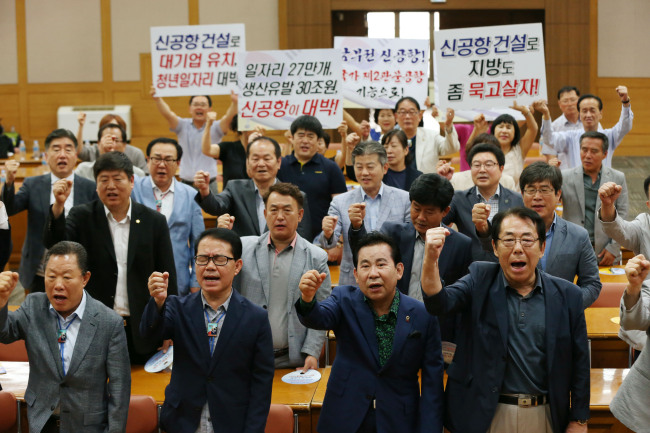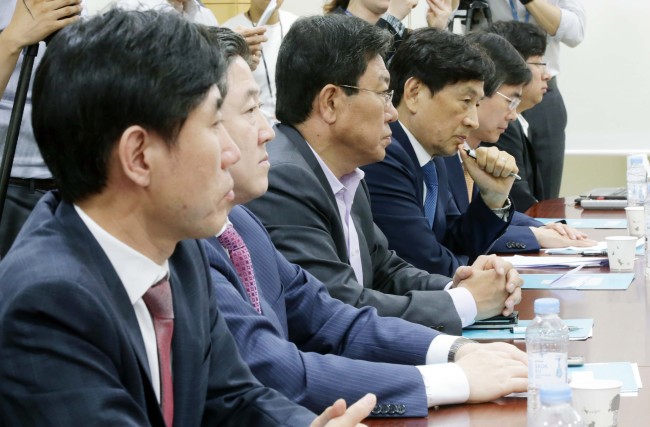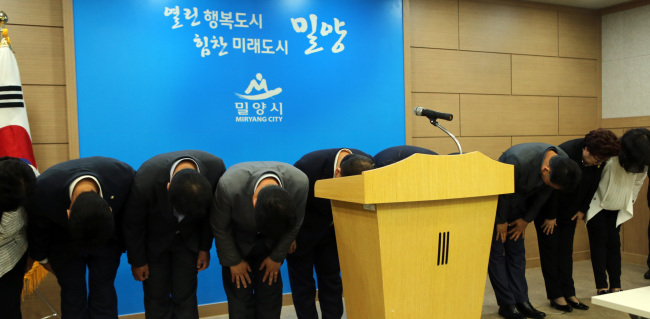[NEWS ANALYSIS] Saenuri faces double jeopardy over scrapped airport plan
By Korea HeraldPublished : June 21, 2016 - 16:49
The government’s decision on Tuesday to scrap the southeast airport plan altogether spared the conservative political camp from the risk of having its largest stronghold region split in half. But it also evoked strong backlashe from both candidate cities which have been counting on the 10 trillion ($8.64 billion) state-led project to revitalize their local economies.
“Instead of building a new airport in (the southeast) Yeongnam, we have decided to expand the (existing) Gimhae Airport (in Busan),” the Ministry of Land, Infrastructure and Transport said during a briefing at the Sejong City Government Complex.
The government’s plan, which scrapped an agenda that has been hanging over political circles over the past 10 years, took the two candidate locations and the conservative camp by surprise.
“Instead of building a new airport in (the southeast) Yeongnam, we have decided to expand the (existing) Gimhae Airport (in Busan),” the Ministry of Land, Infrastructure and Transport said during a briefing at the Sejong City Government Complex.
The government’s plan, which scrapped an agenda that has been hanging over political circles over the past 10 years, took the two candidate locations and the conservative camp by surprise.

Residents and officials of Busan, South Korea’s second-largest city and largest port city, had backed Gadeokdo Island, while the surrounding Gyeongsang provinces had advocated the Hanam field in Miryang, located between Busan and Daegu.
Riled by growing speculation that Miryang would be chosen, those advocating the Busan site had been accusing the government of exerting political influence on the evaluation.
The inland city of Miryang, though relatively low-profile compared to Busan, lies closer to other key Yeongnam cities, including Daegu, the hometown of President Park Geun-hye.
But the ruling Saenuri Party could not afford to lose Busan, in which it has been losing support to more progressive opposition parties.
Riled by growing speculation that Miryang would be chosen, those advocating the Busan site had been accusing the government of exerting political influence on the evaluation.
The inland city of Miryang, though relatively low-profile compared to Busan, lies closer to other key Yeongnam cities, including Daegu, the hometown of President Park Geun-hye.
But the ruling Saenuri Party could not afford to lose Busan, in which it has been losing support to more progressive opposition parties.

It was here that the ruling party lost six constituencies in the April 13 general election, five to The Minjoo Party of Korea and one to an independent candidate. The change in the political climate fanned concerns that the city may slip further away in the 2017 presidential election.
Nonplused by the acute tension between Busan and the rest of Yeongnam, the party leadership said they respected the government’s gray zone gesture.
“The decision (to expand Gimhae Airport) was based on expert judgment and should be respected,” said party spokesperson Rep. Ji Sang-wuk through a statement.
”We now hope to end the consumptive debates and conflicts concerning the airport construction.”
An immediate backlash came from the party’s lawmakers in Daegu, many of whom pledged to bring the new airport to Miryang during the election.
Nonplused by the acute tension between Busan and the rest of Yeongnam, the party leadership said they respected the government’s gray zone gesture.
“The decision (to expand Gimhae Airport) was based on expert judgment and should be respected,” said party spokesperson Rep. Ji Sang-wuk through a statement.
”We now hope to end the consumptive debates and conflicts concerning the airport construction.”
An immediate backlash came from the party’s lawmakers in Daegu, many of whom pledged to bring the new airport to Miryang during the election.

”The announcement was immensely disappointing,” Rep. Yun Jae-ok, chairman of the party‘s Daegu headquarters, told reporters.
”After going through the feasibility test in detail, we will gather opinions from local constituents and discuss counterplans.”
Busan lawmakers, on the other hand, settled for the Gimhae Airport expansion plan as an acceptable alternative.
”Gimhae Airport is not qualified as an international airport, due to its noise problems and limited space,” said Rep. Kim Do-eup, the party’s vice floor leader and second-term lawmaker in Busan.
Another Busan lawmaker Rep. Kim Se-yeon, while agreeing with the complaints, expressed respect for the government‘s efforts to quell the feud.
Rep. Roh Hoe-chan of the minority progressive opposition Justice Party, too, claimed that the government had made a “cool-headed and wise judgment.”
But The Minjoo Party of Korea blamed the administration for egging on regional strife.
“The government has augmented regional divides by dragging on the debate,” said spokesperson Rep. Park Kwang-on through a statement.
The 10 trillion ($8.64 billion) state-led airport plan was initiated in 2011, amid growing concerns on the lack of air transport infrastructure in the southern part of the country, but was scrapped in its early stages due to low commercial viability.
The idea was, however, revived in the following year, as then-presidential candidate Park Geun-hye included it among her campaign pledges.
Gimhae Airport, the only airport in the vicinity, has long exceeded its full capacity in terms of passengers and runway slots. According to Land Ministry data, the number of passengers at Gimhae Airport reached 5.9 million in 2015, up 22.3 percent from the previous year, while its yearly capacity stands at 5.4 million.
By Bae Hyun-jung(tellme@heraldcorp.com)
-
Articles by Korea Herald












![[Today’s K-pop] BTS pop-up event to come to Seoul](http://res.heraldm.com/phpwas/restmb_idxmake.php?idx=644&simg=/content/image/2024/04/17/20240417050734_0.jpg&u=)





![[KH Explains] Hyundai's full hybrid edge to pay off amid slow transition to pure EVs](http://res.heraldm.com/phpwas/restmb_idxmake.php?idx=652&simg=/content/image/2024/04/18/20240418050645_0.jpg&u=20240418181020)

![[Today’s K-pop] Zico drops snippet of collaboration with Jennie](http://res.heraldm.com/phpwas/restmb_idxmake.php?idx=642&simg=/content/image/2024/04/18/20240418050702_0.jpg&u=)